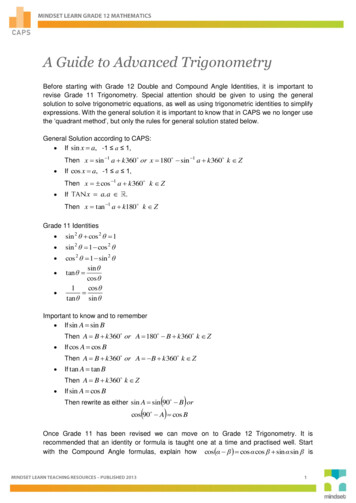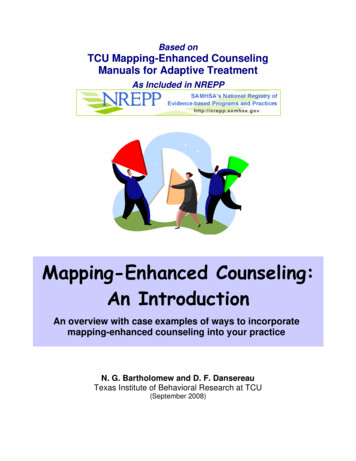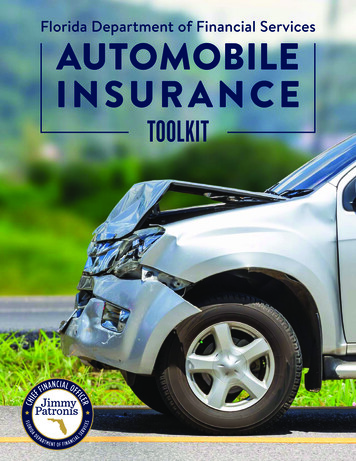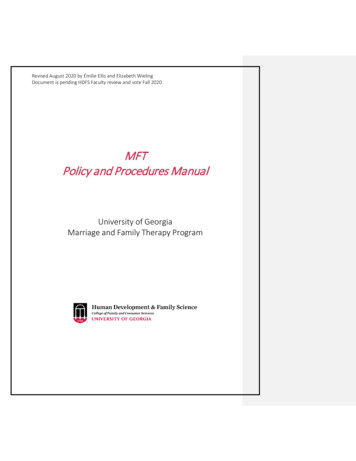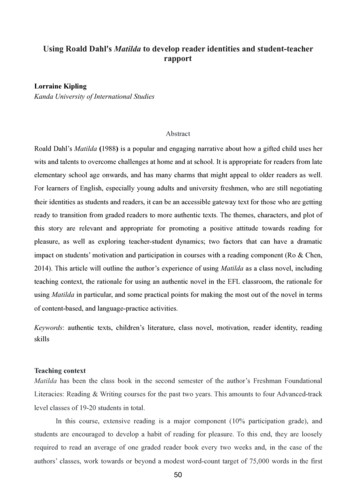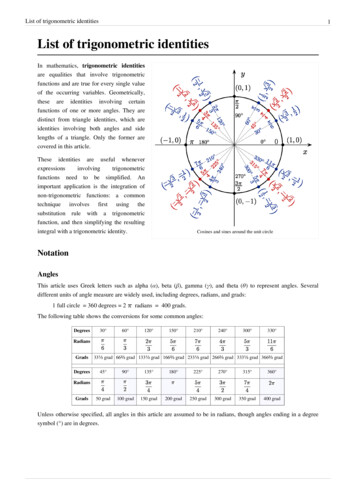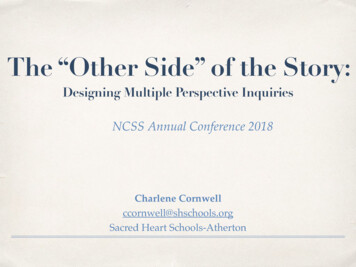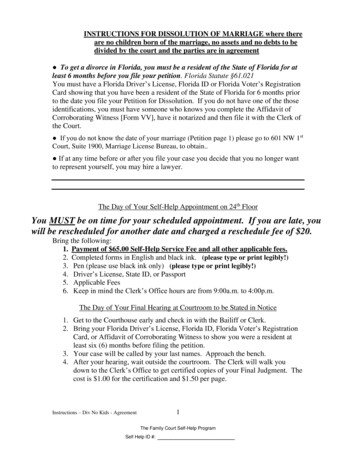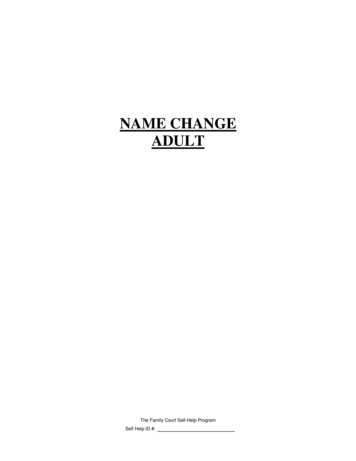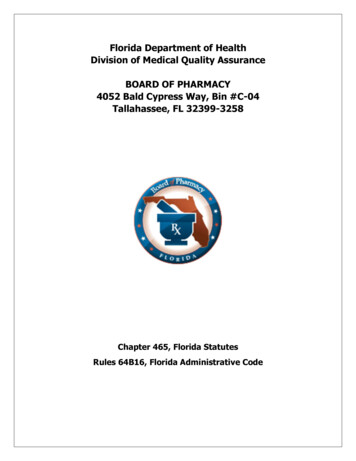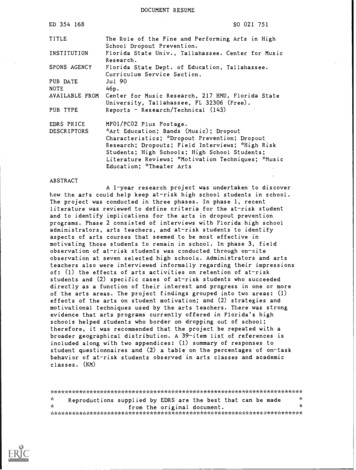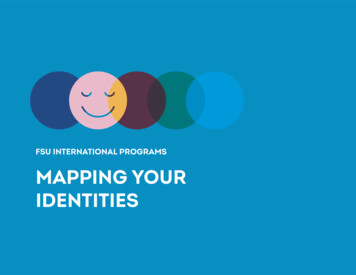
Transcription
FSU INTERNATIONAL PROGRAMSMAPPING YOURIDENTITIES1
Identity Development AbroadCollege provides students the freedom to explore and form their socialidentities through new experiences. Traveling also gives individuals theopportunity to view their identities from a new perspective. The decisionto study abroad comes with a wide variety of emotions as you navigate thislife-changing experience. Study abroad can be a driving force for personalgrowth, change, and discovery.This guide is designed with your wellness and safety in mind. Let it help youstart the process of self-reflection before going abroad and encourageyou to become a better ally to your fellow students. Each section highlightsvarious identities and reflection questions to consider before settingout on your adventure abroad! This list is by no means exhaustive, but itis a starting point as you begin your identity exploration. There may bemultiple identities you relate to and the lenses through which you view andexperience them may vary. If you have any questions or concerns, pleasecontact International Programs.2
CONTENTSOverall Wellness . 5Ability . 8First-Generation Students.10LGBTQIA and Gender Identity . 12Language, Heritage, & Nationality Considerations .14Race & Ethnicity .16Religion.18Socioeconomic Considerations .20Student Athletes . 22Veterans/Military.24Womxn.263
Not every section in this guide may be part of youridentity but reading it entirely will help you understandothers on your program and be better allies for them.FSU is committed to values of diversity and inclusion. However,keep in mind your host culture may not share the same values.The key to success abroad is respect, bothfor your cohort and the host culture.
WELLNESSStudent wellness is paramount to a successful study abroadexperience. As you explore your identities abroad, it is important toconsider your overall wellness throughout the process. Preparation,research, and self-care are at the heart of having a great experienceabroad. While on the program, keep an open mind, withholdjudgment, try new things, and explore who you are. After all, selfdiscovery is one of the greatest benefits of study abroad!On the next couple of pages, you’ll find some wellness reflectionquestions and tips to ponder before going abroad.5
WELLNESSOverall WellnessMental Wellness How do you plan to remain physically, emotionally,and mentally healthy while abroad? What strategies can you develop to managethe stressors of a new environment? Are you aware of the resources availableto you at FSU in Tallahassee and abroadregarding personal health? What do you need to successfully manageyour mental health abroad? What stepswill you take to address these needs? Familiarize yourself with the internationalhealth insurance included in yourprogram fee and what it covers. Will you want to consult with a mentalhealth professional while abroad? Consider how your involvement(s) at homemay change while you are abroad (e.g.,work, community involvement, clubs andorganizations, academic commitments, etc.).Emotional & Social WellnessPhysical & Sexual Wellness Are you currently being treated forserious injury or disease? What willcare for this look like abroad? What does sexual health mean to you? What does sexual safety mean to you? What are you most looking forwardto during this experience? What experiences might challengeyou while you are abroad? What are you expecting to learn during thistrip and how might traveling change you? How do you plan to engage with otherstudents and locals while abroad? What do you need to feel preparedfor this experience? Consider participating in on-campus workshopsfocused on relationship safety, such as Green Dot.Mapping Your Identities6
WELLNESSMedication & DietFinancial Considerations How likely are you to encounter allergies in yourstudy abroad location? What steps will you taketo minimize the risk and/or plan for treatment? How do you plan to maintainfinancial wellness abroad? Have you considered how dietary restrictionscan be accommodated abroad? Will your mainsource of nutrition be available abroad? Will your medications (prescription or otherwise)be available abroad or do you need to bringthem with you? Will you be able to replenishprescription medication while traveling? How much money will you budget for recreation? Have you found a way to manage your budget? Are you aware of the currency exchange ratesbetween your host country and the US? Do you have medications you need tocollect before going abroad? Do you needa larger quantity prescription than usual toaccommodate how long you will be abroad? Are there legal restrictions in your hostcountry for any medications you are taking?Mapping Your Identities7
ABILITYWhile accessibility can look different abroad, InternationalPrograms wants to provide you with resources to help you havean enriching experience during your program. Understandingdifferences in accessibility resources and being prepared beforeyou go abroad can help promote a smooth travel experience.8
Reflection questions and tips toponder before going abroadABILITY If you have not registered with the FSU Officeof Accessibility Services be sure to do so ifyou would like to receive accommodations(e.g., extra test time). On the application,indicate you will be studying abroad. If you are registered with the FSU Officeof Accessibility Services, be sure toconnect with your accessibility specialistto discuss how accommodationsmight apply while you are abroad. Have you communicated your accommodationneeds to International Programs? What accommodations might you needwhile abroad (e.g., a refrigerator formedication, specific room needs, etc.)? What financial obligations related to yourdisability (that are not covered by theprovided health insurance) do you need toprepare for (e.g., medication, equipment,doctor’s visits and treatments, etc.)? Are you willing to disclose your disabilityto others? If so, how will you discloseyour disability and to whom? What are the cultural attitudes toward visibleand invisible disabilities in your host country? How accessible are places in your hostcountry (consider unpaved roads, availabilityof elevators and ramps, etc.)? How will you respond if peoplegive you unsolicited help? Consider how smaller class sizes andinteractive learning experiences mightbe beneficial to your learning style.Ideas for while you’re abroad How can your disability both inform andenrich your experience while abroad? How can you share your perspective ofwhat you are learning and experiencingwith your peers and others? If your disability is mental-health related, whatare specific environments, events, or situationsthat might trigger the aspects of your disability? How could your study abroad programand its facilities, potential excursions,classes, etc. impact your experience?Mapping Your Identities9
FIRSTGENERATIONSTUDENTSBeing the first person in your family to go to college can comewith unique concerns as you navigate the experience. With theabundance of information that comes with starting college, studyingabroad might not be at the forefront of your mind. However,deciding to go abroad can open doors to a variety of incredibleexperiences that can benefit you during college and beyond!10
Reflection questions and tips toponder before going abroadFIRSTGENERATIONSTUDENTS Consider the resources available to guide youthrough the study abroad process, (i.e., the IPwebsite, deadline information, academic andfinancial advising, social media guides, etc.). How can you explain the personal valueof studying abroad to your family? If your family has concerns aboutstudy abroad, be sure to contact IPto speak with someone about it.Ideas for while you’re abroad Do you plan to stay in communication withyour family and friends while abroad? If so,how will you maintain communication? Do you plan to find a community withshared values and interests? If so, how? How can you navigate feelings ofnervousness or homesickness that mayarise as a result of being abroad? How long are you willing to be awayfrom family and friends? How far away do you feel comfortablebeing from family and friends?Mapping Your Identities11
LGBTQIA & GENDERIDENTITYAs you prepare to go abroad, think about your LGBTQIA identitywithin a global context – including cultural attitudes and perceptions.Research and reflect before going abroad and think about other socialidentities you may have that could affect your experience overseas.International Programs has students, staff, and faculty who identify asLGBTQIA and many allies who are an important part of our IP family.Many IP staff members around the globe have participated in theAllies & Safe Zones trainings and are an available resource to you.12
Reflection questions and tips toponder before going abroadLGBTQIA & GENDERIDENTITY How does your study abroad locationview the LGBTQIA community? Research your host country and itscultural practices, beliefs, and laws. Participate in FSU Allies & Safe Zones workshops. Speak with a trusted mentor or campusresource (e.g., Pride Student Union) aboutyour thoughts on going abroad.Ideas for while you’re abroad Is there a local LGBTQIA community you canconnect with or resources for you while abroad? Do you plan to stay in touch with your supportsystem? If so, how will you do that? If possible, what can you do to createbonds of trust among your cohort andcreate a support system while abroad(e.g., sharing and honoring pronouns)? How could your gender expression or sexualorientation impact your study abroad experience?Mapping Your Identities13
LANGUAGE,HERITAGE, &NATIONALITYCONSIDERATIONSPerhaps the most impactful part of studying abroad is being immersed in anotherculture. In preparing to experience the culture of your host country, ponder howyour own heritage, nationality, language skills, and citizenship might affect yourtravels abroad.14
Reflection questions and tips toponder before going abroadLANGUAGE,HERITAGE, &NATIONALITY Understand that if you are of the samenationality of the host country but wereraised elsewhere, you may be identified assomeone who is not native to the country. If you are a person who shares the heritage ofyour host country but were raised elsewhere,how will you be perceived while abroad? What does it mean to be bicultural? Are you used to being part of the culturalminority at home? If so, how might it feelto be a part of the majority abroad?Ideas for while you’re abroad Realize your potential advantage ofspeaking the host country’s languagecompared to your peers who do not. If you are a person who shares the heritageof your host country, and it is your firsttime there, do not be discouraged if you arenot adjusting as quickly as expected. If you are a person who shares the heritageof your host country, what aspectsof the culture do you relate to? How could your citizenship affect your visa status? What are the perceptions of your homecountry in your host country? Research the perception of Englishlanguage use in your host country. Learn basic phrases in your host country’slanguage before going abroad. Don’t be afraidto make mistakes – they’re a great way to learn! What resources are available to you if thereis a language barrier? What steps will youtake to overcome this language barrier?Mapping Your Identities15
RACE ÐNICITYInternational Programs believes each person’s culture and backgroundenrich experiences abroad. One of the best aspects of studyingabroad is experiencing diversity in culture, ethnicity, and race inother countries. With that said, different countries have differentracial and ethnic backgrounds. Before going abroad, research thediversity of the country, how certain groups of people are perceived,and what others who have gone before you have experienced.16
Reflection questions and tips toponder before going abroadRACE ÐNICITY How will your race and/or ethnicity beperceived while in your host country? Research your host country’s cultural norms. Reach out to others about their experiencesabroad regarding race and/or ethnicity.Ideas for while you’re abroad If you experience stares or discrimination inyour host country, how will you react? Is itappropriate to respond openly to such gestures?If so, how can you do so respectfully? How can your racial and/or ethnic backgroundinform and enrich your experience abroad? Have you explored resources on campus thatcan support your efforts in understandingyour race and/or ethnicity in a globalcontext (e.g., Center for Global Engagement,Student Government Agencies, etc.)? Consider the availability in your hostcountry of products and services youutilize (e.g., hair care, skin care, etc.). Consider how people may react tohow they perceive your identity. Will you be perceived as being the majorityrace/ethnicity in your host country?Mapping Your Identities17
RELIGIONAn important part of being abroad is exploring what you believeand learning about what others believe and how they live their lives.Pondering the role religion may or may not play in your life is useful asyou journey to a country where the minority and majority religions andlaws regarding religion may be different than what you’re used to.18
Reflection questions and tips toponder before going abroadRELIGION Is religion a prevalent part of the culturein which you will be studying?Ideas for while you’re abroad Recognize that in some countries there isno separation between church and state. Be respectful of local laws regarding religion. How does your host country viewcertain religions? How does your hostcountry view atheists/agnostics? Will you be part of the religious minorityor majority in your host country? Recognize that access to places ofworship may vary while abroad. Is it safe for you to wear religious clothingand/or symbols in your host country? How will you feel participating in academic andcultural excursions to places of worship? How canyou be respectful of those places of worship? If you have religious dietary restrictions, how willthey be accommodated in your host country? How will you communicate your religiousneeds to those you are living with?Mapping Your Identities19
SOCIOECONOMICCONSIDERATIONSStudy abroad is an important financial decision and hopefully these tips andreflection points will help you navigate the process of planning your financesbefore and during your time abroad. The key to successfully financingyour trip abroad is research. Do your research on the many scholarshipsavailable to help fund study abroad, how your existing financial aid mayapply, and what is included in your program fee. The world is within yourreach, but it takes a bit of work to figure out how to make all the piecescome together. But don’t worry, we’re here to help get you there.20
Reflection questions and tips toponder before going abroadSOCIOECONOMIC Consider meeting with InternationalPrograms’ financial aid advisor beforeapplying and/or before departure to planhow you can afford to go abroad. Can your financial aid be applied towards thecost of your program? If so, are there anyeligibility requirements for financial aid? Be sure to research scholarship opportunitiesearly in the process for options on how tofund your study abroad experience.Ideas for while you’re abroad Stick to your budget. How will you communicate your financialboundaries with your peers who may havedifferent expectations than you? Are there any student discountson dining, sight-seeing, etc.? Are there affordable sight-seeing activitiesavailable within your host country? When are scholarship deadlines? Do you needto plan ahead for letters of recommendation? What amenities are and are not includedin your study abroad program? Could there be any additional orunexpected costs (e.g., extra baggagefees, clothing, personal travel, etc.)? What is the cost of living in your hostcountry compared to home? Develop a budget before you go abroad ofhow much you will spend while there (e.g.,food, transportation, cell phone, activities). How will you be respectful of otherstudents who may have larger or smallerspending budgets than you?Mapping Your Identities21
STUDENTATHLETESAs a collegiate athlete, your sport can be demanding – but there is awhole world out there waiting to be explored! Studying abroad can be anopportunity to consider your identity outside of your sport. While yourparticipation in your sport may not last a lifetime, memories and lessonslearned while abroad certainly will!22
Reflection questions and tips toponder before going abroadSTUDENTATHLETESIdeas for while you’re abroad Talk to your coach about going abroad. Reflect on what is important toyou outside of your sport. With your coach, come up with a communicationand training plan that is reasonably attainablebased on your program, courses and resources. Enjoy the moment! If you can, try not to stressabout training and competition. Think about howyour mind and body might benefit from the rest. Search for opportunities to continuetraining in your program location(i.e., available facilities, other athleticopportunities for cross-training, etc.). Is it possible to use your time abroad as amental and physical break from your sport? Will your athletic aid apply to yourprogram? What other scholarshipopportunities or funding options exist? How will you balance your academics,training, and international experience?Mapping Your Identities 23
VETERANS /MILITARYAs a veteran or military-connected student, you may haveserved or are currently serving in a country outside theUnited States. Reflecting on that experience can help prepareyou for your academic endeavor in a foreign country.24
Reflection questions and tips toponder before going abroadVETERANS /MILITARY How do your veteran/military benefits apply toyou while studying abroad (e.g., VA, DoD, etc.)? Will you need to list your militaryservice on your visa application? If so,how might that affect your visa? As an active-military student, how do you obtainclearance before traveling out of the country?Ideas for while you’re abroad How can your distinct perspectives andprevious global endeavors contribute toparticular experiences while studying abroad? How will your military service be receivedamong locals in your host country? Has the US military been involved in prior actionwith or in your host country? If so, what is theperception of those actions among locals? How will any security clearances you havebe affected by you studying abroad? In addition to your military passport, will youalso need and do you have a civilian passport? As part of your military service or training, willyou need to maintain a fitness regimen whileabroad? If so, will there be facilities for you to use?Mapping Your Identities 25
WOMXNStudying abroad as a womxn can be liberating and exciting, butthere are also unique considerations to traveling as a womxn.Prepare yourself by researching local laws and traditionsregarding womxn in your host country. Be comfortable asyourself abroad while staying aware of your surroundings andthinking about how you could be perceived while traveling.26
Reflection questions and tips toponder before going abroadWOMXN What are the social norms and practicesrelated to gender in your host country? In your host country, traditionally,what role do womxn play? Are there traditional expectations surroundingdress in the location you are traveling to?Consider requirements for entering historic,government, and religious sites specifically.Ideas for while you’re abroad Going outside of your comfort zone can be a greatlearning experience, but how can you maintainyour safety and mental health if an experienceis more uncomfortable than you expected? How could your perspective as a womxninform and enrich your experience abroad? What strategies can you use to ensure yoursafety while abroad? Consider the buddysystem, having a communication plan, etc.Mapping Your Identities 27
ResourcesReferencesAllies & Safe ZonesInstitutionsAthletics DepartmentArizona State UniversityCenter for Academic Retention & Enhancement (CARE)Brown UniversityCenter for Health Advocacy & Wellness (CHAW)George Washington UniversityGreen DotMiddleburyInterfaith CouncilNC State UniversityInternational Programs OfficeUniversity of ChicagoOffice of Accessibility Services (OAS)University of KansasOffice of Financial AidUniversity of MichiganStudent Government Association AgenciesStudent Veterans CenterUniversity Counseling CenterOrganizationsForum on Education AbroadISEP Study AbroadInstitute for Study AbroadUS State DepartmentUS Transportation Security AdministrationUnited NationsWebsites & PublicationsDiversity AbroadGoAbroad.comI’m First: A Strive InitiativeAuthored by Zoë Crook, Vanessa Guirey, HannahTalking Religion: Religious Diversity in Study Abroad Advising byMeister, Lauren Schoenberger, and Stephanie TillmanTimothy Lynn Elliott (BYU) and Lorien Romito (Babson College)international.fsu.edu @fsuip28
FSU International Programs Diverse experiences worth celebrating29
identities through new experiences. Traveling also gives individuals the opportunity to view their identities from a new perspective. The decision to study abroad comes with a wide variety of emotions as you navigate this life-changing experience. Study abroad can be a
